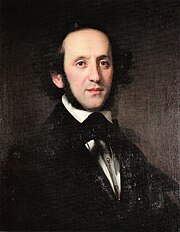Mitten wir im Leben sind a motet by Felix Mendelssohn as the third and final part of his Kirchenmusik, Op. 23,[1] described as a "small choral work",[2] for SSAATTBB choir, a cappella in the key of C minor in cut time. The text was written by Martin Luther, based on the Latin antiphon "Media vita in morte sumus" (in the midst of life we are in death). The motet was published in 1830.[3]
| Mitten wir im Leben sind | |
|---|---|
| Motet by Felix Mendelssohn | |
 The composer in 1846, portrait by Eduard Magnus | |
| English | Even in the midst of life |
| Key | C minor |
| Text | "Mitten wir im Leben sind" by Martin Luther |
| Language | German |
| Published | 1830 |
| Scoring | SSAATTBB choir |
Music
editMendelssohn wrote to his sister Fanny on November 22, 1830 that the motet was one of the best church pieces that he had ever written, and that it "growls angrily, or whistles, dark blue."[4]
For the first and second verses, the tenors and basses begin by contemplating a question, the sopranos and altos answering, and the tenors and basses finishing the answer. The tempo then speeds up, with a plea for mercy as the choir builds into a repeated "Kyrie eleison" sung at fortissimo. The third verse is structured differently, having all the parts sing throughout the verse. There is also no tempo change, but a few dynamic changes.
References
edit- ^ Cooper, John Michael; Prandi, Julie D. (2002). The Mendelssohns: Their Music in History. Oxford University Press. ISBN 978-0-19-816723-5.
- ^ Griffiths, Paul (2004-10-07). The Penguin Companion to Classical Music. Penguin UK. ISBN 978-0-14-190976-9.
- ^ Cooper, John Michael (2001). Felix Mendelssohn Bartholdy: A Guide to Research : With an Introduction to Research Concerning Fanny Hensel. Routledge. ISBN 978-0-8153-1513-1.
- ^ "Felix Mendelssohn Bartholdy: Mitten wir im Leben sind - Noten | Chormusik kaufen". Carus-Verlag. Retrieved November 7, 2023.